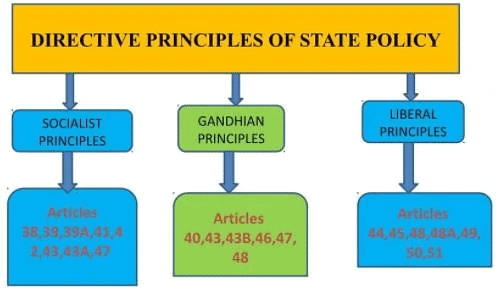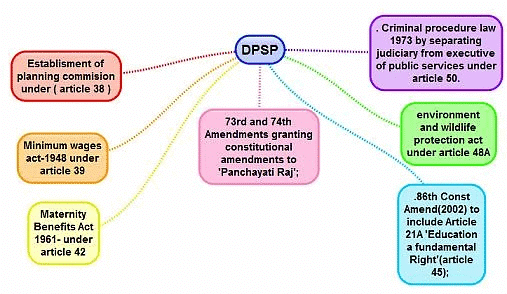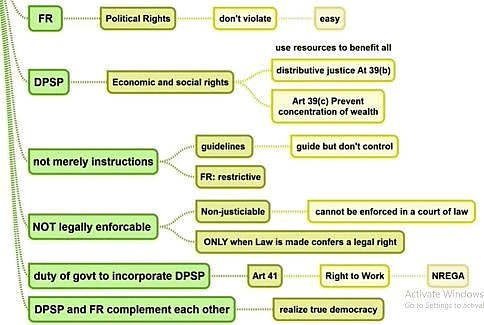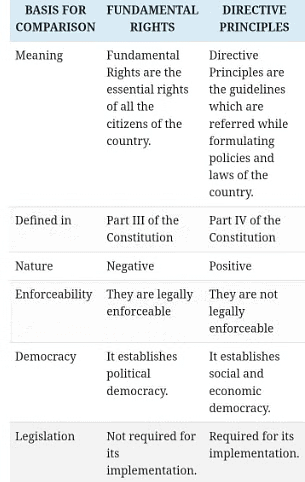Overview: Directive Principles of State Policy | Indian Polity for UPSC CSE PDF Download
| Table of contents |

|
| Directive Principles |

|
| Precedence |

|
| What are the new DPSPs added by the 42nd Amendment Act 1976? |

|
| Enforceability of DPSP |

|
| DPSP and Fundamental rights |

|
Part IV (Arts. 36-51) of the Constitution contains the Directive Principles of State Policy. The principles reflect a unique mixture ofhumanitarian socialist precepts, Gandhian ideals and democratic socialism. Though not enforceable, they constitute the fundamental principles of Governance. Most of the Directives aim to establish economic and social democracy as pledged in the Preamble. It shall be the duty of the State to follow these principles both in the matter of administration as well as in the making of laws.
Directive Principles
- Art. 36:Defines the term state as in Part III.
- Art. 37:The provisions of Part IV shall not be enforceable by any court, but principles are fundamental in the country's governance and it shall be the State's duty toapply these principles in making laws.
 Directive principles of state policy
Directive principles of state policy
- Art. 38: State to secure a social order for the promotion of the welfare of the people. In particular, it is to minimise inequalities in income and eliminate inequalities in status, facilities and opportunities.
- Art. 39:Certain principles of policy to be followed by the State forsecuring adequate means of livelihood for all citizens, common good by distribution of ownership and control of the material resources of the community, an economic system that does not result in the concentration of wealth and means of production to the common detriment, equal pay for equal work for both men and women, health and strength of workers including children and opportunities and facilities for children to develop in a healthy manner and in conditions of freedom and dignity and be protected against exploitation.
- Art. 39-A:Added by the 42nd Amendment, requires the State to secure equal justice and free legal aid.
- Art. 40: Requires the State toorganise village panchayats and endow them with such powers and authority as may be necessary to enable them to function as units of self-government.
- Art. 41: Requires the State to make effective provisions for securing the right to work, to education and to public assistance in cases of unemployment, old age, sickness and disablement, and in other cases of undeserved want.
- Art. 42:Requires the State to make provisions for securing just and humane work conditionsand for maternityrelief.
- Art. 43:Directs the State to secure, to all workers, agricultural, industrial or otherwise, work, a living wage, conditions of work ensuring a decent standard of life and full enjoyment of leisure and social and cultural opportunities and, in particular, to promote cottage industries on an individual or co-operative basis in rural areas.
 DPSP with some amendments
DPSP with some amendments
- Art. 43-A:Added by the 42nd Amendment, directs the State to take steps to secure workers' participation in the management of undertakings, establishments or other organisations engaged in any industry.
- Art. 44: Requires the State to securea uniform civil codefor the citizens throughout India's territory.
- Art. 45: Directs the State to provide, within ten years from the commencement of this Constitution, forfree and compulsory education for all children up to the age of fourteen years.
- Art. 46: Requires the State to promoteeducational and economic interests of the weaker sections of the people, and, in particular, of the Scheduled Castes and the Scheduled Tribes, and protect them from social injustice and all forms of exploitation.
- Art. 47: Directs the State to raise the level of nutrition and the standard of living and to improve public health, and, in particular, prohibit consumption except for medicinal purposes of intoxicating drinks and of drugs injurious to health.
- Art. 48: Directs the State to organise agriculture and animal husbandry on modern and scientific lines and prohibits the slaughter of cowsand calves and other milch and draught cattle.
- Art. 48-A:Added by the 42nd Amendment, directs the State to protect and improve the environment and safeguard the country's forests and wild life.
- Art. 49:Directs the State to protect monuments places and objects of national importance from spoliation, disfigurement, destruction, removal, disposal or export, as the case may be.
- Art. 50: Directs the State to take steps to separate judiciary from executive.
- Art. 51: Directs the State to
(i) Promote international peace and security.
(ii) Maintain just and honourable relations between nations.
(iii)Foster respect for international law and treaty obligations in the dealings of organised people with one another and
(iv)Encourage settlement of international disputes by arbitration.
Classification of Directive Principles
Directive principles may be classified into various groups.
Social and Economic Justice:
- Social order based on justice: Art. 38 (1) and 38 (2) require the State to maintain a social order based on justice.
- Distributive justice: Distributive justice is the common aim of Art. 38. and 39. They propose to promote equality in wider perspective and create circumstances to avoid injustice at the social and economic levels.
Ideals of Social Security:
- Right to work, education and public assistance in certain cases (Art. 41) Recently, the Supreme Court declared, in Mohini Jain's case, that the right to education be equated with a fundamental right and should be read with Art. 22. This is because the right to life means a dignified life, which has no meaning without education.
- Free and compulsory education for children up to 14 years (Art. 45).
- Promotion of educational and economic interests of the weaker sections (Art. 46).
- Raising the standard of living and improvement of health (Art. 47).
- Equal justice and free legal aid (Art. 39A).
- Just and human conditions of work (Art. 42).
- Living wage etc. for workers (Art. 43) and
- Participation of workers in the management of industries (Art. 42A)
Community Welfare Ideals:
- Uniform Civil Code (Art. 44)
- Organisation of agriculture and animal husbandry (Art. 48)
- Protection and improvement of forests and animal life (Art. 48A)
- Protection of monuments and places and objects of national importance (Art. 49)
- Separation of judiciary from the executive (Art. 50)
- Promotion of international peace and security (Art. 51)
- Organisation of village panchayats (Art. 40)
Significance of Directive Principles
Directive Principles even though they are not enforceable in the courts of law, Art. 37 unequivocally enjoins that "it shall be the duty of the State to apply these principles in making laws. Owing to the legal deficiencies of the Directives the utility of their incorporation in the Constitution, which is a legal instrument has been questioned. Directives were intended as moral precepts for the authorities of the State. Directives emphasise, in amplification of the Preamble, that the goal of the Indian polity is a welfare state. Also, the Court should keep in mind the Directive Principles while interpretation of statutes.
Implementation of Directive Principles
Though implementation has been far from satisfactory, the State is showing a genuine will to implement the directive principles. In electoral politics, no government may, with impunity, ignore welfare oriented policies with regard to public health, education, economic equality, position of women, children and backward classes in the planning process.
The following are some areas where directive principles have shown some impact.
- Art. 39: A series of Acts have been passed from time to time such as Employees State Insurance Act, Minimum Wages Act, Wealth Tax Act, Estate Duty Act and so on. Legislatures of almost all the states and Union Territories passed Land Reform Acts which fixed ceilings on land holdings and the surplus land acquired from land owners was distributed among the landless workers. The Legislatures of almost all the states and Union Territories passed Acts for the abolition of intermediaries like zamindars, jagirs and more than three crores of farmers became the owners of land.
- Art. 40: A large number of laws have been enacted to organise village panchayats and endow them powers of self-government.
- Art. 43: For the promotion of cottage industries which is a state subject, the Central Government has established several Boards to help the State governments, in the matter of Finance, Marketing and the like.
- Art. 44: The enactment of the Hindu Marriage Act (1955) and the Hindu Succession Act (1956) have been important steps to implement the directives of uniform civil code.
 DPSP- Characteristics, origin, and nature
DPSP- Characteristics, origin, and nature
- Art. 45:Legislation for compulsory primary education exists in many states.
- Art. 46: Various programmes to educate the tribal youth and promote the welfare of scheduled tribes and scheduled castes have been taken up.
The Mandal Commission has been declared constitutional. The state has provided reservation in government jobs to the socially and educationally backward (SEB). - Art. 47:For raising the standard of living, particularly of the rural population, the Government of India launched its Community Development Project in 1952. The Department of Women and Children Development continued its programmes in the areas of women's development as well as of the child development
Precedence
Both the fundamental rights and the directive principles constitute the conscienceand core of the Constitution. They promote the pledged aim of the Preamble of the Constitution to establish the welfare state. While fundamental rights are 'primary' and 'fundamental', the directive principles are no less important than fundamental rights and they are binding on the various organs of the state (A.B.Soshit Karamchari Sangh vs Union of India, SC 1981).
 Difference between Fundamental rights and directive principles
Difference between Fundamental rights and directive principles
The directives differ from the fundamental rights contained in part III of the Constitution or the ordinary laws of the land, in the following ways:
Directives are not enforceable by the court (Art. 37) and do not create justiciable rights in favour of the individuals; but fundamental rights are enforceable by court (Arts. 32, 226).
Directives are positive inducementsand the state is only expected to follow them. Fundamental rights are negative limitations on organs of the states.
Directives are implemented by the legislation sought from the legislative list contained in the 7th Schedule of the Constitution. Fundamental rights are incorporated in the Constitution and are within the jurisdiction of an individual.
The courts cannot compel the State to implement the directives. They can issue writs to enforce the violation of fundamental rights.
The courts cannot declare any law as voidon the ground that it contravene the directive principles.
- In State of Madras vs. Champakam (1951), the Supreme Court highlighted the unenforceable nature of the directive principles. It declared that no law could be declared void on the ground of contravening the directive principles.
- However, the 25th Amendment Act (1971) introduced Art. 31C, which was to protect a law seeking to implement a directive under 39 (b)-(c) (ownership and control on material resources for common good to avoid concentration of wealth) from being declared ultra vires on the ground of contravening.
- The Kesavanand Bharati case (1973) upheld the validity of 25th Amendment Act. The 42nd Amendment (1976) (section 4) further expanded the scope of the directive principles under Art. 31C. It sought to protect any law implementing any of the directive principles from judicial review on the ground of violating Arts. 14 and 19.
- However, theMinerva Mills case (1980)foiled the attempt to accord primacy to the directives over fundamental rights. It struck down the expansion of Art. 31C to include any or all of the Directives in Part IV, on the ground that such total exclusion of judicial review would offend the 'basic structure' of the Constitution.
- As a consequence, Art. 31C is restored to the pre-1976 position so that a law would be protected by Art. 31C only if it has been made to implement the Directive in Art. 39 (b)-(c) and not any of the other directives included in Part IV.
- It has also been held that there is a fine balance in the original Constitution as between thedirectives and the fundamental rights, which should be adhered to by the courts. It is also held that when a law is challenged as constituting an invasion of the fundamental right specified in Art. 14 or 19 or 31, the court would uphold the validity of such law if it had been made to implement a Directive, holding that it constituted a 'reasonableclassification' for the purpose of Art. 14, a 'reasonablerestriction' under Art. 19 or a 'publicpurpose' within the meaning of Art. 31.
- As regards fundamental rights other than those under Arts. 14, 19 and 31, though the Directives cannotdirectlyoverridethem, the court may not entirely ignore the Directive Principles and should adopt the principle of harmonious construction so as to give effect to both as much as possible.
The Directive in other Parts of the Constitution
Besides the Directives contained in Part IV, there are certain other Directives addressed to the State in other parts of the Constitution, which are also nonjusticiable. These are:
- Art. 350A enjoins every State and every local authoritywithin the State to provide facilities for instruction in the mother-tongue at the primary stage of education to children belonging to linguistic minority groups.
- Art. 351 enjoins the Union to promote the spread of the Hindi languageand to develop it so that it may serve as a medium of expression of all the elements of the composite culture of India.
- Art. 335 enjoins that the claims of the members of the Scheduled Castes and the Scheduled Tribes shall be taken into consideration, consistently with the maintenance of efficiency of administration, in the making of appointments to services and posts in connection with the affairs of the Union or of a State. Though the Directives contained in Arts. 335, 350 A, 351 are not included in Part IV, Courts have given similar attention to them on the application of the principle that all parts of the Constitution should be read together.
What are the new DPSPs added by the 42nd Amendment Act 1976?
42nd Amendment Act, 1976 added four new Directive Principles to the list:
To read more on the 42nd Amendment Act, 1976, aspirants may check the linked article.
Facts about Directive Principles of State Policies
- A new DPSP under Article 38 was added by the 44th Amendment Act of 1978, which requires the State to minimize inequalities in income, status, facilities, and opportunities.
- The 86th Amendment Act of 2002 changed the subject matter of Article 45 and made elementary education a fundamental right under Article 21A. The amended directive requires the State to provide early childhood care and education for all children until they complete the age of six years.
- A new DPSP under Article 43B was added by the 97th Amendment Act of 2011 relating to cooperative societies. It requires the state to promote voluntary formation, autonomous functioning, democratic control, and professional management of cooperative societies.
- The Indian Constitution under Article 37 makes it clear that ‘DPSPs are fundamental in the governance of the country and it shall be the duty of the state to apply these principles in making laws.’
44th Amendment:
- The 44th Amendment Act of 1978 added Article 38(2) to the DPSP.
- Article 38(2) says that the state shall work to minimize the inequalities in income and endeavor to eliminate inequalities in status, opportunities, etc., not only amongst individuals but amongst all the groups of people residing in different areas or engaged in different fields.
86th Amendment:
- The 86th Amendment changed the subject of Article 45 in the DPSP and brought it within the ambit of the fundamental rights mentioned in Part III as Article 21-A has been made for children between the age group of 6-14 years of age. The same article was previously a directive principle that says that the State should take care of children who are below six years of age.
97th Amendment:
- The 97th Amendment act of 2011 inserted Article 43-B in the list of DPSP. It says that the State shall endeavor to promote voluntary formation, autonomous functioning, democratic control, and professional management of the cooperative societies.
Enforceability of DPSP
- DPSP was not made enforceable by the Constituent Assembly, which was formed to draft the Indian Constitution. But the non-enforceability of the Principles does not mean that they are unimportant.
- Some arguments are in favor of its enforceability and some are against the making of DPSP enforceable. Those who favor the enforcement of the Principles argue that the enforceability of DPSPs will keep a check on the Government and would unite India. For instance, Article 44 of the Indian Constitution talks about the Uniform Civil Code, which aims for uniform provisions of civil law for all the citizens of the country irrespective of their caste, creed, religion, or beliefs.
- People who are against the enforcement of the DPSPs are of the view that these principles need not be separately enforced as there are already many laws that indirectly implement the provisions mentioned in DPSP. For instance, Article 40 of the Constitution, which deals with the Panchayati Raj system, was introduced through a constitutional amendment, and it is very evident that there are numerous panchayats exist in the country today.
- Another argument against DPSP is that it imposes morals and values on the citizens of the country. It should not be clubbed with the law as it is really important to grasp that law and morals area unit various things. If we impose one on the opposite, that will generally impede the expansion and development of society.
DPSP and Fundamental rights
Fundamental rights are the basic human rights enshrined in the Constitution of India, which are guaranteed to all citizens. In Part III of the Constitution, certain rights are granted to citizens to allow them to live peacefully. These rights act as a safeguard to ensure that the Government does not restrict any of the fundamental rights given by the Constitution. They are applied without discrimination on the basis of race, religion, gender, etc. Significantly, fundamental rights are enforceable by the courts, subject to certain conditions.
Why are they called Fundamental Rights?
These rights are called fundamental rights because of two reasons:
- They are enshrined in the Constitution, which guarantees them
- They are justiciable (enforceable by courts). In case of a violation, a person can approach a court of law.
List of Fundamental Rights:
There are six fundamental rights in the Indian Constitution along with the constitutional articles related to them are mentioned below:
- Right to Equality (Article 14-18)
- Right to Freedom (Article 19-22)
- Right against Exploitation (Article 23-24)
- Right to Freedom of Religion (Article 25-28)
- Cultural and Educational Rights (Article 29-30)
- Right to Constitutional Remedies (Article 32)
Directive Principles of State Policy are some important guidelines given to the government so that it can work accordingly and refer to them while formulating the laws and policies and building a just society.
These principles are mentioned in Part IV from Articles 36 to 51 of the Constitution.
Directive Principles are non-justiciable. However, these are recognized as important roleplayers in governing the State. These principles aim at creating such an environment that can help the citizens to live a good life where peace and harmony prevail.
The directive principles conjointly gauge the performance of the state in order to achieve the objectives stated in the preamble of the Indian Constitution.
Comparison between DPSP and Fundamental rights

Criticism of Directive Principles of State Policy
The following reasons are responsible for the criticism of Directive Principles of State Policy:
- It has no legal force
- It is illogically arranged
- It is conservative in nature
- It may produce constitutional conflict between centre and state.
What is the conflict between Fundamental Rights & DPSPs?
With the help of four court cases given below, candidates can understand the relationship between Fundamental Rights and Directive Principles of State Policy:
1. Champakam Dorairajan Case (1951) Supreme Court ruled that in any case of conflict between Fundamental Rights and DPSPs, the provisions of the former would prevail. DPSPs were regarded to run as a subsidiary to Fundamental Rights. SC also ruled that Parliament can amend Fundamental Rights through constitutional amendment act ti implement DPSPs.
Result: Parliament made the First Amendment Act (1951), the Fourth Amendment Act (1955) and the Seventeenth Amendment Act (1964) to implement some of the Directives.
2. Golaknath Case (1967) Supreme Court ruled that Parliament cannot amend Fundamental Rights to implement Directive Principles of State Policy.
Result: Parliament enacted the 24th Amendment Act 1971 & 25th Amendment Act 1971 declaring that it has the power to abridge or take away any of the Fundamental Rights by enacting Constitutional Amendment Acts. 25th Amendment Act inserted a new Article 31C containing two provisions:
- No law which seeks to implement the socialistic Directive Principles specified in Article 39 (b)22 and (c)23 shall be void on the ground of contravention of the Fundamental Rights conferred by Article 14 (equality before law and equal protection of laws), Article 19 (protection of six rights in respect of speech, assembly, movement, etc) or Article 31 (right to property).
- No law containing a declaration for giving effect to such policy shall be questioned in any court on the ground that it does not give effect to such a policy.
3. Kesavananda Bharti Case (1973) Supreme Court ruled out the second provision of Article 31C added by the 25th Amendment Act during Golaknath Case of 1967. It termed the provision ‘unconstitutional.’ However, it held the first provision of Article 31C constitutional and valid.
Result: Through the 42nd amendment act, Parliament extended the scope of the first provision of Article 31C. It accorded the position of legal primacy and supremacy to the Directive Principles over the Fundamental Rights conferred by Articles 14, 19 and 31.
4. Minerva Mills Case (1980) Supreme Court held the extension of Article 31C made by the 42nd amendment act unconstitutional and invalid. It made DPSP subordinate to Fundamental Rights. Supreme Court also held that ‘the Indian Constitution is founded on the bedrock of the balance between the Fundamental Rights and the Directive Principles.
Rulings by SC:
- Fundamental Rights & DPSPs constitute the core of the commitment to social revolution.
- The harmony and balance between Fundamental Rights and Directive Principles of State Policy is anessential feature of the basic structure of the Constitution.
- The goals set out by the Directive Principles have to be achieved without the abrogation of the means provided by the Fundamental Rights.
Conclusion
Today, Fundamental Rights enjoy supremacy over the Directive Principles. Yet, Directive Principles can be implemented. The Parliament can amend the Fundamental Rights for implementing the Directive Principles, so long as the amendment does not damage or destroy the basic structure of the Constitution.
|
154 videos|994 docs|260 tests
|
FAQs on Overview: Directive Principles of State Policy - Indian Polity for UPSC CSE
| 1. What are Directive Principles of State Policy (DPSPs) in India? |  |
| 2. What new Directive Principles were added by the 42nd Amendment Act of 1976? |  |
| 3. Are Directive Principles of State Policy enforceable in a court of law? |  |
| 4. How do Directive Principles of State Policy relate to Fundamental Rights? |  |
| 5. What is the significance of Directive Principles of State Policy in Indian governance? |  |
















